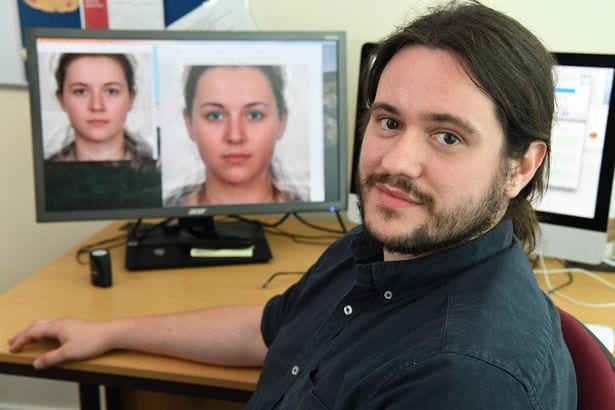What do you work on?
How our faces influence social behaviour!
Essentially, why and how we judge others based on their appearance, and whether there is truth in these judgments.
“People unconsciously associate someone who looks Extraverted with words describing that trait. Using Gorilla, we are now expanding these studies to explain the effect using clinical populations.”
What did you do using Gorilla?
I have set up a variant of the Implicit Association Test, where people respond to words that describe high and low variations of personality traits (e.g., ‘outgoing’ or ‘reserved’ to describe high or low Extraversion), and classify faces with names (such as Mary or Jane). The catch is that the faces are the predicted appearance of individuals high or low on those traits – the faces actually convey high and low Extraversion. The faces are created using facial averaging software on the photographs of individuals who score very high or very low on a personality questionnaire measuring their Big 5 traits.
We found that people unconsciously associate someone who looks Extraverted with words describing that trait.
Using Gorilla, we are now expanding these studies to explain the effect using clinical populations – people with prosopagnosia or alexithymia for example. This will clarify the cognitive processes that might explain this unconscious association – i.e., is it due to identity recognition, or is it due to emotion recognition?
“I can now focus on analysis, interpretation, and testing ideas, rather than laboriously programming experiments and waiting for data.”
For you, what is the stand-out feature in Gorilla?
The flexibility. Other online platforms can handle a few different kinds of study types – e.g., questionnaires, rapid presentation of stimuli, but no platform brought them together in the way Gorilla does. In hand with this is its ease of use. At first I thought it would be difficult to use given its flexibility, but even complex experiments are simple to set up in less than an hour.
What is the most exciting piece of work or research you’ve ever done?
The work I am currently trying to publish on an approach I call ‘face regression’, which is a bottom up way of visualising the relationships between facial appearance and given traits (e.g., trustworthiness). This is based on linear modelling, and allows us to tease apart appearances – for example, we visualise the effect of attractiveness on trustworthiness, and it turns out that purely trustworthy faces are not so trustworthy!
How do you think online research is going to change your field?
Much of the work in my field was quick to adopt online methodologies. But I think across psychology this is going to really change how we understand human behaviour, simply because classically in-lab tasks can be completed by anyone, anywhere. For a field that is now publicly known for its replication crisis, caused in part by homogenous and small samples, this is real progress.
What is the biggest advantage of online research methods?
I see two. The first is that we can access a much larger sample than ever before, which increases our generalizability and inferences. Psychology is in dire need of this! The second is that it makes it easier to access participant samples that are difficult to access. More recently I have used Gorilla in cross cultural studies, with collaborators sharing Gorilla studies with populations in Africa and South America.
Why did you choose to use Gorilla?
I campaigned heavily for Gorilla to be adopted by my department. For one, it would solve a lot of problems we had with space constraints, because lab based studies could be put online. More than that, we were also impressed by its utility as a teaching tool that illustrates experimental design and flow clearly to students.
How did Gorilla make your life or research better, easier or faster?
The biggest benefit has been taking experiments that generally require lab-based computers for timing accuracy, and allowing them to be put online, reaching a far wider participant pool than before. But, the amount of time that is saved is really significant. I can now focus on analysis, interpretation, and testing ideas, rather than laboriously programming experiments and waiting for data.
“Other online platforms can handle a few different kinds of study types – e.g., questionnaires, rapid presentation of stimuli, but no platform brought them together in the way Gorilla does.”
What advice would you give to someone starting out in behavioural science/research?
Probably to learn a programming language (like R or Python), and become ‘data-literate’.
Being able to handle your own data and understand it is a skill that is widely applied beyond research, but will open many doors within academic research, as the skill is so valuable.
Are there any online courses, podcasts, discussion groups or resources that you’d recommend to others?
I really like DataCamp for learning data analysis and handling skills, and Everything Hertz for a podcast on the state of psychology. These have helped broaden my analytical and critical skills over the past few years as a new lecturer.
When you’re not working, what do you enjoy doing?
Running! I spent my 20s working every hour under the sun in research, now I am more secure I’ve tried to take interest in my health and wellbeing. I have found running really helps. It doesn’t stop me from thinking of research while running, though!
What’s your favourite science internet meme?
Probably the ‘I have no idea what I’m doing’ dog. Its such an accurate representation of what research is like, but no one really admits to it!




